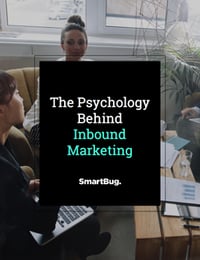
The Lies Companies Tell Themselves that Hinder Marketing Success
September 29, 2017
By Amber Kemmis

When Steve Jobs and Steve Wozniak started the journey to the Apple we know today, they had a garage, a Volkswagen van, and an HP scientific calculator. Not a lot of assets, for sure, but just enough to push an idea over the edge and, with time, turn Apple into one the most, if not the most, successful brand and product of all time. Interestingly, like most of us, Wozniak wasn’t confident that the development skills of his time would make a staple in mankind’s history. It was actually Jobs who convinced Wozniak to go all in. At the time, Wozniak had little faith in his abilities, but Jobs encouraged to push further. Fast forward to today—you and I both know how this story ends: Apple becomes synonymous with bread and water, and your iPhone or whatever smartphone you use is within one foot of you right now.
When you stop telling yourself lies, you get somewhere. In Wozniak’s world, a lie was telling himself that "I was shy and felt that I knew little about the newest developments in computers." On a personal level, it might be a feeling that you are too shy, clumsy, or messy to achieve success. For companies, the lies go much deeper, involve multiple people, and tend to have a huge negative impact on the success of marketing.
Throughout my experience and the experience of my colleagues, we hear lies—lies that cripple the potential to make marketing a success and lead to company growth. Here are some of the most common lies we’ve heard at SmartBug and in previous roles that, when corrected, can lead to a huge amount marketing success:
‘We Are the Best at What We Do, Period’
When I think of this lie, I can’t help but think of the song lyric, “My milkshake brings all the boys to the yard.” And the title is followed by, “Damn right, it’s better than yours.” I have seen companies toot their horn as loudly as Kelis does in that song. Being proud of what you do is important, but you must be completely aware of your company’s shortcomings, because being too comfortable and confident in what you do can limit growth.
This lie is especially dangerous when you consider a concept known as confirmation bias or myside bias. Confirmation bias is the psychological tendency to seek out information that confirms or reinforces pre-existing beliefs. When it comes to companies that think they are the best, confirmation bias often comes into play when they hear positive reviews from prospects or customers. Naturally, a company gets overly excited about these kinds of reviews, but may overlook comments from prospects who don’t totally get what they do, or from customers who complained and then jumped ship for a competitor.
If you really do want your milkshake to bring all the boys to the yard (or buy your product or services), you must completely understand what makes you great and what makes you fall short. By understanding your company’s position on both, you can stay ahead of the curve and focus on fixing gaps, not touting what’s already working.
‘MQLs Don’t Matter’
The definition of a marketing qualified lead varies by company, but for most, an MQL is anyone who you want to engage with via marketing. Typically, savvy marketers will classify MQLs as people who are engaged already, meet a certain amount of ideal prospect criteria, and are likely to buy from you or spread the word about you in the future. Because MQLs aren’t a direct measure of ROI, a common lie companies tell themselves is that such leads do not matter. In reality, MQLs are like the tiny plants in a garden a month after you’ve planted the seeds: You don’t have vegetables to eat yet, but if you ignore these seedlings and fail to nurture them, you won’t have a harvest in a few months. When you measure MQLs and their overall growth, you ensure that you have enough leads and engaged contacts in your database to fuel future sales qualified leads and customers.
‘6 Months or It Will Never Happen’
We all want quick results. That’s exactly what I wanted when I started a 30-day health challenge and hoped to have abs of steel in less than a month. The truth is, however, results that last and achieve optimal success will take time. Inbound, SEO, and organic digital results are more like a marathon than a 100-meter sprint. When I hear companies say “It’s been six months and we don’t see results; it won’t work, and we are throwing in the towel,” I cry a little. To put in perspective, imagine you hike three-fourths of the way up a mountain but you can’t see the majestic view of the valley yet. Do you turn around or keep going? Of course you keep going! But in business and for companies that have just ventured into marketing in general or are trying inbound for the first time, you have stakeholders, budgets, and much more on the line. This is why it is extremely important to understand that when investing in certain marketing channels, the strategy is long-term but well worth the wait. In the meantime, plenty of digital avenues are available that can supplement your efforts.
‘We’re Acquiring Customers; Therefore, We Win’
Gaining customers is great, especially if you are gaining enough to meet goals. Whether you are a tech company or pro services firm, getting a new customer is something to celebrate. However, acquiring a customer can be less celebratory if you are also losing customers at the same time. In today’s world, where the customer has all the power in the buying decision, you cannot fail to focus on customer retention. If you're willing to invest in acquiring a customer, you must also invest in keeping them. Otherwise, your initial investment will never truly see ROI.
‘We’ve Had a Blog and It Was a Flop’
Having a blog and having a successful blog are two completely different things. Both LeBron James and I play basketball, but I am not making $30 million this year on my basketball skills. There is a significant difference between doing something and doing something well, even when it comes to marketing.
Successful blogging takes strategy, planning, consistency, and persistence. If you missed one of those keys, I wouldn’t be surprised that your blog flopped. In terms of strategy, you must understand your buyer personas (an often overlooked element for blogging) to know not only the right content to produce, but also the channels you should utilize to bring people to your blog. In addition, strategy is only as good as its execution, which is why planning, consistency, and persistence are equally as important. More often than not, poor execution causes a blog to flop. For example, I’ve seen companies blog daily but not figure out why they aren’t seeing any leads or customers come from their blog. The missing element? Not a single one of their blogs was utilizing CTAs or a way to to capture leads. When they add these strategies, good prospects rain down like cats and dogs.
‘People Know Who We Are and What We Do’
It’s amazing how companies will seek out the help of an agency or ramp up their marketing efforts, but as the story unfolds, they insist that people know who they are and what they do and don’t need to further educate prospects via their website, content, email nurturing, and so on. These organizations are living in a bubble and need to test awareness outside of their inner circle and current client base. Often, we find out that not many people really know what the company does when its product or service is difficult to understand to someone outside of the company, especially when reading materials versus listening to the 20-minute pitch. Companies tell themselves this lie because they have a certain amount of business from those who know them, but they are missing out on the growth potential they could have through better marketing and product education.
‘What We Do Is Complicated’
This lie is quite contrary to the previous lie but is still as prohibitive to success. We often see this lie when working with companies on writing website copy. We distill what they do into short paragraphs that will pass the short attention span of web users, but the client comes back to say that what it does is complicated and we need to add more explanation. People don’t buy complicated, though—they buy things they understand, and usually buy based on the perceived outcomes they will get from whatever they are purchasing. When it comes to businesses that are “complicated,” marketing is only successful if you can make what you do simple and understandable to the outside world. You do not need to give lengthy explanations for people to get what you do and want to buy it.
‘Our SMEs Are Too Busy to Contribute to Content’
In companies where leveraging the expertise of subject matter experts or thought leaders is critical, nothing is more limiting to marketing than those people being “too busy” to contribute. First of all, we live in a world where saying you know something isn’t enough—people expect you to actually show them that you know it. You can do this through content.
In a post on Medium, American author Jeff Rivera emphasizes that there’s no such thing as “busy,” only other priorities. Thus, when your SMEs say they are too busy, they really just have other priorities, which is completely understandable if you haven’t done a great job at convincing them that their expertise in content should be a priority. Marketers must create excitement around the idea of these experts contributing to content, but they also must emphasize that content is a critical component to remaining “experts” today and in future customers’ eyes.
Another lie that companies often tell themselves is that their SMEs aren’t great writers and, therefore, can’t help contribute content. The truth is, however, that SMEs don’t have to be great writers. They just need to give up an hour or so a few times a month to be interviewed by someone who can write.
‘We Don’t Want to Open the Kimono’
This lie, which is often also presented as, “We don’t want to open a can of worms,” or “We don’t want to ruffle any feathers,” often comes up when ideas are presented that are out of the box or push the envelope. In baseball, there’s a reason that players steal bases; ure, it can be a bit risky and may lead to an out, but playing it safe doesn’t win the game. There will inevitably be ideas, strategies, or tactics that not everyone in the company agrees with. They may even be completely new to everyone in the company, which means they may “open the kimono,” but you must be willing to do things that others won’t because these are the actions that will leave a lasting, positive imprint on your marketing success.
‘We Want to Focus Only on Our Core Business or Expertise’
This lie is far too common among companies just venturing into content marketing for the first time. They want to keep content closely aligned to their bread and butter or where they have the most subject matter expertise. This lie can be extremely limiting, however, for a couple reasons. If you only stick to your core business or expertise, you will eventually run out of things to say. You will also quickly bore your audience with the same repeat topics. Variety is the spice of life, and just because you focus content on areas outside of your core business or expertise does not mean you won’t acquire customers from that content. You may be wondering how you can be seen as an expert in content, even if you don’t know a topic end-to-end. First, research gives any writer the ability to be an expert in what they write. Second, interviews can fill the void where research falls short.
‘Our Audience Isn’t on Social Media’
Fun fact: Roughly 79 percent of online users use Facebook, according to 2016 Pew research. This means that if your audience is online, there’s a good chance they are also on Facebook, not to mention other social channels such as LinkedIn and Twitter. Compared with five years ago, I hear this lie much less often, but I do still hear it, especially in regards to Facebook. With Facebook’s ad targeting demographics, however, this lie could seriously be the unicorn of all channels for your company, even if you’re B2B. Maybe it doesn’t make sense for your company to invest in regular social media management, but it is worth exploring further by researching similar brands on social and, at least, testing paid ads to get you started.
‘Nobody Searches This Online; No Need to Do Digital’
It is true that there are some businesses whose audience won’t follow the typical Buyer’s Journey; however, the idea that nobody searches the subject online is farfetched. Even if your buyers aren’t researching at the top of the funnel, they or someone they delegate the work to likely will do online research at some point of their buying decision. It’s almost second nature for people to do a Google search on someone or something when they first hear about it, especially when your prospects have internal conversations about your company. Thus, I don’t know anything else to say except that it is 2017 and you must have a digital presence!
Stop Telling Lies!
Next time your company makes an excuse like these, stop yourself and ask, “Am I telling myself a lie?” Think about how bad the consequences really could be if you stop telling the lie. Likely, they aren’t as horrific as they might seem at first.
Now, it’s your turn! What lies have you heard that you believe are prohibiting marketing success?

About the author
Amber Kemmis was formerly the VP of Client Services at SmartBug Media. Having a psychology background in the marketing world has its perks, especially with inbound marketing. My past studies in human behavior and psychology have led me to strongly believe that traditional ad marketing only turns prospects away, and advertising spend never puts the right message in front of the right person at the right time. Thus, resulting in wasted marketing efforts and investment. I'm determined to help each and every one of our clients attract and retain new customers in a delightful and helpful way that leads to sustainable revenue growth. Read more articles by Amber Kemmis.










